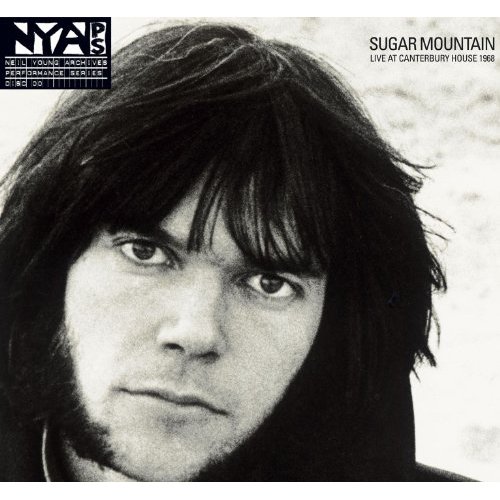
Neil Young
Sugar Mountain: Live At Canterbury House 1968
Release Date: Nov 20, 2008
Genre(s): Rock, Pop, Country
Record label: Reprise
Music Critic Score
How the Music Critic Score works
Buy Sugar Mountain: Live At Canterbury House 1968 from Amazon
Album Review: Sugar Mountain: Live At Canterbury House 1968 by Neil Young
Excellent, Based on 8 Critics
Based on rating 9/10
Sugar Mountain: Live at Canterbury House 1968 the third installment from Neil Young's Archives -- although through some weird filing system this is Vol. 00, possibly because this dates before either of the previously released volumes in Archives Performance Series -- culls highlights from Neil Young's two shows at Canterbury House in Ann Arbor, MI on November 9 and 10, 1968. Like its two predecessors in the Archives series, the concerts captured on Sugar Mountain are legendary among Neil Young collectors, in this case because of the gentle, tentative version of the title track that showed up on Decade -- prior to this, the only official release from the concert.
Based on rating 9.0/10
The question of necessity arises when discussing Neil Young’s solo acoustic Sugar Mountain: Live at Canterbury House 1968, the third release in his long-anticipated Archives series -- especially because Young already put out a solo acoustic concert, Live at Massey Hall 1971, just over a year ago. That question is rendered moot, however, as soon as the songs begin to roll: The Neil Young featured here is not the same man whose eccentric genius dominates Live at Massey Hall. On that album, Young was on the other side of having released 1970’s After the Gold Rush and was on the cusp of delivering 1972’s Harvest; he was already solidifying into the rock legend we now know him as.
Based on rating 9.0/10
Maybe it’s time to rewrite the Neil Young history booksThe young Neil Young-the earnest, folk-oriented singer-songwriter of the late 1960s/early 1970s-has come to be viewed as an almost-outsider artist with his strangely ethereal, wavering high-tenor voice interpreting songs preternaturally melancholy about such subjects as getting old, being alone and needing love. He seemed a young man out of time-which may be one reason he chose to invest so much equal time in being a more familiar electric rocker. But Sugar Mountain: Live at Canterbury House 1968occurring after Buffalo Springfield’s break-up but before the release of his first album-offers a different interpretation: Young the raconteur: a relaxed, funny and engaging stage presence capable of witty, personal monologues worthy of a talk-show host or observational stand-up comedian.
Based on rating 4/5
To anyone but the most dedicated fan, the Neil Young Archives - an exhaustive documentation of his four-decade live career - looks like a superfluous and self-indulgent extravagance. You don't have to be much of a fan, however, to appreciate the latest instalment: recordings culled from two gigs that took place days before his 23rd birthday and the release of his debut solo album. The tracklist ebbs and flows between tunes unknown to the audience, Buffalo Springfield material and songs from his teenage years (the tremulous lament for youth, Sugar Mountain), and strikes a consistently plaintive note.
Based on rating 4/5
Yet another impressive release from Neil Young's seemingly bottomless vault of previously unissued recordings, Sugar Mountain is an intimate live acoustic set from a two-night stand in 1968. You have to wonder why he bothers releasing substandard new material when he's sitting on a gold mine from his creative peak. The small, rapt crowd in attendance at Cantebury House seems to make Young comfortable enough to try some rarely performed compositions written in 1963 and 64, and we're treated to what could be the greatest-ever versions of Sugar Mountain, Birds, The Old Laughing Lady and The Loner, along with revealing anecdotes that put the songs in the context of Young's coming-of-age.
Based on rating B+
Neil Young’s seemingly bottomless archive yields Sugar Mountain — Live at Canterbury House 1968, a pair of acoustic concerts recorded soon after he left Buffalo Springfield. His meandering monologues contrast with the top-notch if uniformly pensive songs. ”Mr. Soul” and ”Expecting to Fly” reprise the then-recent past, while tracks like ”The Loner,” the exquisite ”Birds,” and the bittersweet title song provide a live demo tape of his immediate future.
Based on rating 7/10
Neil Young’s Greatest Hits is “perfect” because it “offers nothing, NOTHING to the Neil Young fan,” asserted Anthony Miccio in Stylus Magazine’s 2004 review. It panders instead, blatantly and wonderfully, to the casual admirer, the listener to whom ‘greatest hits’ means… well, the ‘greatest hits’ and nothing more. This is an intriguing notion of perfection, under which Sugar Mountain: Live at Canterbury House 1968, Young’s third in a series of archival live recordings, feels like the direct antithesis, and not just because the title track is the closest it comes to a radio staple.
Opinion: Fantastic
Prefacing a stark rendition of "Mr. Soul," Neil Young likens himself to a radio station, a mere conduit to the songs pouring out of him. Such is the charm of Sugar Mountain, documenting a 22-year-old songsmith tangled up in transition. More relaxed and personable than in his previous archive installment, Live at Massey Hall 1971, Young guides the audience with endearing sincerity through his recent past with Buffalo Springfield ("On the Way Home," "Expecting to Fly") and tentatively approaches his future through the twisted narrative "The Last Trip to Tulsa" and the reflective, long-prized title track.
'Sugar Mountain: Live At Canterbury House 1968'
is available now

